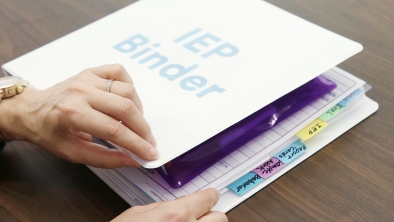
In 2001 when we first learned that Katie had autism, I was anything but an advocate. What I knew about autism was ignorantly based on the movie Rainman. After receiving the diagnosis, we were warned off going on the internet. Unfortunately, that was the first thing I did. I had no idea how to weed through what I was reading to find what I needed to know.
When Katie was evaluated by our public school’s early intervention preschool, I was surprised at how clinical and direct the psychiatrist and those evaluating our daughter were. It all was so harsh and frightening. I would go to these meetings alone. There would be a school psychiatrist, speech therapist, occupational therapist, administrator, classroom teacher and me. The meetings always felt very “one-sided” and I didn’t understand how to advocate for Katie. In later years, I began making sure meetings were scheduled so that my husband could attend. I also brought a friend that was a special education teachers in another district and another friend that was a social worker. I asked everyone to use their voice during the meeting! This definitely changed the dynamic and made the meeting more “balanced”.

It is my belief that most teachers and therapists have an invested interest in our children and do care about them. The problem is that when an administrator is in the room and a teacher is aware of constant “budget rumblings” within a district, a teacher will be hesitant to advocate for a therapy or service that will cost the district additional funds. The administrators job in the meeting is to make sure that all follow the law, but, I believe, they are always thinking about the bottom line.
Because of the number of people the school has in the meeting, a parent can easily feel intimidated and less willing to strongly advocate for their child simply because they are outnumbered and intimidated.
Here are some strategies that I have used over the years to help keep the meeting centered on Katie’s needs and how to best help her reach her potential.
- Communication. When you receive your invitation to attend a 504 planning, Individualized Education Plan (IEP) or Evaluation Team Report (ETR) meeting, respond to your case manager and ask to discuss your child’s needs BEFORE the meeting. If you have areas of concern, it is best to get them out on the table as the planning for the meeting takes place. Work directly with your child’s case manager to discuss possible goals and objectives that might work for your child. There are also plenty of websites out there that offer goals that you can read through and modify based on your child’s needs. Remember, YOU are a member of this team and have equal input.

- Documentation. I keep a binder with tabs for current IEP and previous year’s IEP, Progress Reports, ETR, Concerns (homework or tests that raise a need for services) and miscellaneous. Save every email you send and receive in a folder in your email. Save all communication with teachers, case manager, therapists, administrators, etc. You will be surprised at how often you will catch a “mistake” if you keep all communication. Bring this binder to all meetings along with any other supporting documentation you might need. When asking for a service or therapy the district will likely not agree with, bring research studies supporting those services and therapies. This past summer, I was asking the district to bring in a behaviorist to evaluate and plan for the school year. The district was fighting me so I went onto my son’s college library site and found study after study supporting a behavioral approach. It is hard for a district to argue with proven documentation and studies.

- Evalutions and 504 or IEP Draft. You have the right to receive all evaluations and/or drafts well in advance of the meeting. If this cannot be provided, you then have the right to request that the meeting be postponed so that you have the appropriate amount of time to review everything before the meeting.

- Appropriate & Necessary. At the meetings, do not use the words “I want”. Your wants, needs and desires are set aside during the meeting and you must use the language “necessary and appropriate”. Example: Based on Suzie’s recent speech evaluation that showed regression, it would be necessary appropriate to provide her with Extended School Year (ESY). Leave your emotions at the door.

- Attendance. You must do everything you can to attend all meetings related to your child. If you are not in attendance, the meeting WILL take place without you and your opinion will not matter. A close friend was recently in the middle of her chemo treatments and was afraid to enter a school building during the height of flu season. She arranged to be on a conference call for the whole meeting so that she could fully participate.

- Documentation. The district will likely have one person designated to take copious notes during the meetings. Since you will be actively participating in the meeting, it will be difficult to take your own notes. You could choose to bring a friend or family member along to take notes. You could also ask for a Parent Mentor for your district to attend the meeting and take notes for you. The easiest way I have found to solve this problem is to audio record the meeting. If at the beginning of the meeting you announce you plan to record it, your district should have no problem and will likely choose to audio record the meeting also. I downloaded an app to my phone called Voice Record Pro that allows me to record the meeting and then transfer the file to my hard drive.

- Consent. At some point during the meeting, everyone in the room will be asked to sign a form to state they were in attendance at the meeting. At the close of the meeting, you will be asked to sign a consent form to implement the IEP. You are not required to sign that form during the meeting. You can choose to take the IEP home and review it and decide if you are in full agreement.

- Follow-up. After the meeting, it is important to follow-up with all in attendance regarding any concerns that arose during the meeting. You may also request a follow-up meeting.
Remember, you know your child better than anyone in that room. You are your child’s “voice” and are responsible for consistently reminding your school district that you will make sure your child’s needs are met.